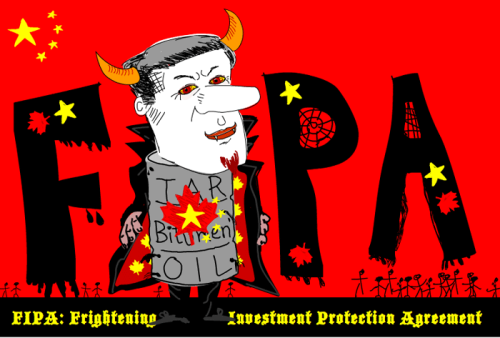
The News Review | 13 August 2015
FIPA license to treat Canadians
Gus Van Harten
Since winning a majority in 2011, perhaps the most significant and irreversible decision by the Harper government was its lopsided investment deal with China.
Among other concerns, the Canada-China Foreign Investment Promotion and Protection Agreement (FIPA), ratified in 2014, is a license to be unfair to Canadians.
Imagine that your community opposes a Chinese investor’s project. The government supports the investor. Your community manages to block the project after years of court battles. The Chinese investor then uses its new FIPA right to sue Canada for compensation.
Your community would have no right of standing - meaning a full right to participate - in the FIPA arbitration. That would be so even if the Chinese investor’s FIPA lawsuit smeared people in the community, even if it ended in an award that affected its reputation, or even if it led to a settlement in which the government agreed to change course and force the project through anyway.
Actually, your community would not even have a right to know the Chinese investor’s lawsuit existed.
That is Canada now, brought to you by the FIPA. Corporate lawyers, sitting as FIPA arbitrators, can make decisions that affect individual Canadians without ever hearing from them.
This lack of fairness is a basic flaw in foreign investor protection treaties like the FIPA. The treaties use the lopsided process of investor-state arbitration to decide disputes that affect third parties and the public. Yet they raise only foreign investors, not other private parties, to the level of sovereign countries in international disputes. Only the foreign investor that brings the claim and the national government of the country that is sued can have full standing.
This process contradicts a basic rule of fairness. The rule is captured in the common law by the maxim audi alteram partem, meaning the other side must be heard. It’s in Latin because it’s an old rule.
The risk of unfairness to Canadians under the FIPA is very real. Arbitrations under similar treaties clearly have affected parties other than foreign investors. Yet no one but the foreign investor and the government could seek full standing in the arbitration. No one else had a legal right to access the record and to make full submissions, as a fair process must allow.
Tying the hands of others in this way may suit Chinese investors and the federal government. For example, it might make it cheaper and easier for them to resolve their dispute, at the expense of an unrepresented party. But that should matter. Like in a court process, the process should allow all those who have an interest in the outcome to seek standing.
Promoters of investor-state arbitration sometimes say that this unfairness was fixed by letting arbitrators give “friend of the court” status to parties other than the foreign investor and the federal government. The FIPA allows for this limited option, saying that arbitrators “may accept written submissions” from a person or organization who “has a significant interest in the arbitration” so long as the submission “does not disrupt the proceedings and that neither disputing party is unduly burdened or unfairly prejudiced by it.”
This response is clearly inadequate. If someone has a significant interest in the outcome of a FIPA arbitration, then he or she should be able to seek full standing to the extent of the interest. That is fair; the alternative - a possible opportunity to make a written submission at the arbitrators’ discretion - is not.
It also should not matter if a Canadian’s participation may “disrupt the proceedings,” as the FIPA says, or if it means a Chinese investor or the federal government is “unduly burdened.” These provisions in the FIPA are another way of saying the process is an exclusive system for foreign investors, at the expense of anyone else who is affected by the dispute.
When he sought his majority in 2011, Stephen Harper did not promise to accept an investment deal with China that is unfair to Canadians. But he did it anyway.